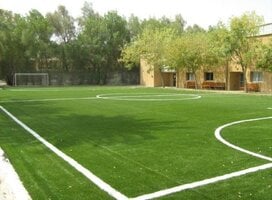Teach English in Kuwait
One of the richest countries in the Middle East, Kuwait is looking for English-speaking educators to teach its growing population. The primary language in Kuwait is Arabic. However, English is widely spoken here and there is a huge demand by many, from preschoolers to university students, to learn the language.
Kuwait is a small country dominated by its capital, Kuwait City. This hip metropolis offers all the comforts and conveniences of a modern city while also providing a unique window into Arab culture and society.
A stone’s throw from downtown, you’ll find well-preserved archaeological sites, vast desert landscapes, and white sandy beaches. Offering some of the best incentives for international teachers, Kuwait is an ideal destination for those interested teaching while being immersed in Arab culture. This is an exciting place to live and work as long as you do not mind year-long sunshine!
Preschools
There are a growing number of bilingual preschools in Kuwait, which present a great opportunity to work with young children and teach them English from an early age. Most of these positions require a Bachelor’s degree and at least one year of prior experience working with preschool-age children.
International Schools
Most opportunities to teach in Kuwait will be at international schools. These schools usually follow the curriculum of schools in the United Kingdom or the United States. At an international school, you will have the opportunity to teach a variety of subjects, including science, math, art, and history -- as well as English.
International schools in Kuwait cater to a mix of local students and those from abroad. You will likely have students from several countries learning side-by-side In your classroom. Working in one of these schools provides many great opportunities for cultural exchange.
Universities
Kuwaiti universities are looking for native English teachers to add to their faculties. One attractive part of teaching at a university here is that you don’t need a Ph.D. A Bachelor's, or better yet, a Master's in an English-related subject plus a TEFL certification is usually all that is required.
Kuwaiti universities run on a similar model to western universities. You will likely find yourself teaching freshmen and sophomores in large lecture halls to help them improve their already well-developed language skills.
When to Apply for Jobs in Kuwait
With the school year beginning in August, most job listings are posted in the spring and summer. This is the best time to apply for jobs. However, there may be the occasional vacancy throughout the year.
How to Apply for Jobs in Kuwait
You can often apply for a job directly with the school that is looking for candidates. This can be done from home. If the school likes your application, you will then have a phone or video interview.
While most people apply remotely to schools in Kuwait, already being in the country may give you a leg up on the competition as it will give you the opportunity to interview in person and maybe teach a demo class.
Average Salary for Teaching Job in Kuwait
Kuwaiti schools offer a very competitive salary. Most teachers can expect to earn a monthly salary that ranges between $2,500 to $4,000. In addition to a salary, teaching in Kuwait has a number of other perks such as free housing, flights to and from the country, and health insurance. Also, teaching salaries are not taxed!
Qualifications Needed
You should have a TEFL or similar certification to teach in Kuwait. In addition, you will need a Bachelor’s degree -- a Master's degree will make you even more competitive. Prior teaching experience is almost always required. Two years of relevant experience is typically the minimum, but the more years in the classroom you have, the better off you will be.
Popular Destinations to Teach in Kuwait
Kuwait is a small country and much of its 6,880 square miles is empty desert. This means that there are few locations within the country to teach.
Kuwait City is the country’s only major urban center. Most international schools are located here. This vibrant metropolis is home to many first-rate museums, parks, traditional markets, and restaurants, making it a very attractive location to live and teach in.
The nearby cities of Al Ahmadi and Al Jahra also have a few international schools. These smaller cities offer a slower pace than the more frenetic capital.
Visas & Sponsorship
If you are from the United States, the U.K., Australia, Canada, or about 30 other countries, you can get a tourist visa upon arrival, valid for one month. Otherwise, you need to apply for a visa in advance.
Upon receiving a job offer, your employer will apply for a work visa on your behalf. Known locally as an iqama, this visa will allow you to live and earn money in Kuwait.
Teacher Work Culture in Kuwait
Expect to work closely with your colleagues in Kuwait. Collaboration is a valued trait here. You can expect this to extend beyond the classroom as well. Coworkers regularly socialize outside of work and you might even be invited to meet the families of other teachers. This is a cross-cultural opportunity not to be passed up.
Kuwaiti schools are organized similarly to schools in North America and Europe. There is a primary school of grades one through five and an intermediate school with grade six through grade ten. The next two grades are at a secondary school. Many international schools have all these grades under one roof.
There is a strict dress code for teachers in Kuwait. Always dress professionally and conservatively. This is especially the case for women, whose shoulders and knees should always be covered.
Classroom Etiquette in Kuwait
You will most likely teach in conjunction with Kuwaiti teachers in classes of 20 to 25 students. Students are generally not permitted to socialize in the classroom. Many schools have a special room reserved for socializing known as a diwaniya.
Spend time building up a good rapport with your students. Patiently getting to know your students will increase trust in this culture of tight friendships and family relationships.
Health & Safety
Traffic accidents are one of the leading causes of death in Kuwait. Large vehicles, winding roads, and poorly-enforced traffic laws make driving here a dangerous endeavor. Take extreme caution when on the roads or avoid them completely when you can.
Crime rates are low in Kuwait, but common-sense precautions should always be practiced. Alcohol and intercourse outside of marriage is illegal, and can potentially lead to jail time.
Kuwait City is home to several modern and well-equipped hospitals and the state of medical care in the country is very good overall. There are no required vaccines for travel to Kuwait, but the CDC recommends protecting yourself against typhoid and hepatitis A.































